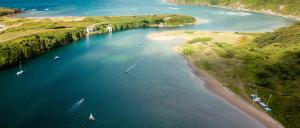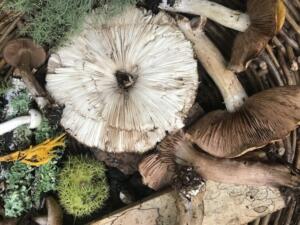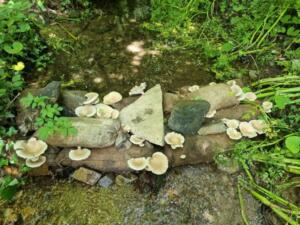
Grants
Landscape Regeneration
Flete Field Lab
£8,500 awarded
Project Dates: 01.04.2025 to 01.07.2025
DEF’s Flete Field Lab project, now in its fourth year, remains committed to pioneering and testing nature-based solutions for environmental remediation.
With a proven track record in this innovative field, FFL brings together a multidisciplinary team of experts, supported by scientists, academics, farmers, and local communities. This collaborative approach enables them to design practical interventions that restore degraded water and soil ecosystems, while generating credible evidence of their effectiveness.
This grant will provide FFL with 3 months of crucial gap funding while current students continue to conduct experiments, providing lab results to prove findings and demonstrate impact. The goal is to attract further funding during this period, that will launch the project into it’s next phase (see below).
Project Objectives: Flete Field Lab aims to restore degraded soil and water ecosystems; promoting biodiversity, improving water/soil quality, increasing carbon sequestration.
Project Methodology: Flete Field Lab’s approach includes using native fungi to remove pollution from water and producing biochar from local materials to enhance soil quality and sequester carbon.
- Mycoremediation: Using native fungi like Oyster Mushroom and Turkey Tail to remove pollutants from water. FFL has found Oyster Mushrooms can remove 45% of E. coli, and the team is also testing Turkey Tail fungi for removing nitrates and phosphates. FFL is conducting pioneering trials to remediate Biological Oxygen Demand in dairy wastewater.
- Biochar: Researching the impact of biochar on soil health, nutrient and water retention, and agricultural yields. FFL plans to produce 2.5 tonnes of biochar to apply to local farmland, and will conduct tests to measure the impact on soil and crop health.
- Regulatory Engagement: FFL is working with Natural England and the Environment Agency to establish standardised methods for their solutions.
Images courtesy of Flete Field Lab.


IMPACT SUMMARY OCTOBER 2025:
Project Activities:
- 12-month efficacy study for the project’s first mycoremediation product: designing, documenting and resolving regulatory issues around the product, resulting in a low-tech product ready to launch with potential river groups using an accessible open-source format for information sharing.
- Study reports / Masters Dissertations for 5 Student Led studies (4 Mycoremediation and 1 Biochar). Resulting in: further validation of Summer Oyster removing significant e.Coli and testing its longevity through using ‘swiss roll’ design. Using Turkey Tail to remediate Nitrates and Phosphates via two styles of intervention. Further evidence that biochar supports a significant increase in soil life.
- Convening and working with regulatory authorities in particular the Environment Agency and Natural England to agree a protocol for use with mycoremediation using native fungi in watercourses.
- Conversations ongoing about application of biochar and potential for carbon sequestration as potential revenue for farmers/funding opportunities from Government.
- Setting up FFL to be an effective and pioneering research, convening and delivery organisation for the long term.
- Development and implementation of communication, fundraising and commercialisation plans that will result in funds / profits to sustain the CIC beyond 2026.
Project Outcomes:
- The project has trialled highly innovative but ‘low tech’ experiments using biochar and mycofiltration in South Devon to build evidence on the efficacy of these natural remedies to soil and water quality issues. In doing so, the project has successfully moved towards its goal of placing the tools for nature regeneration, particularly soil and water habitats, back into the hands of the people who love, live and work on the land.
- In doing so the project pushes back against the degradation of soil and water ecosystems, driven by intensive agriculture and unsustainable water management.
